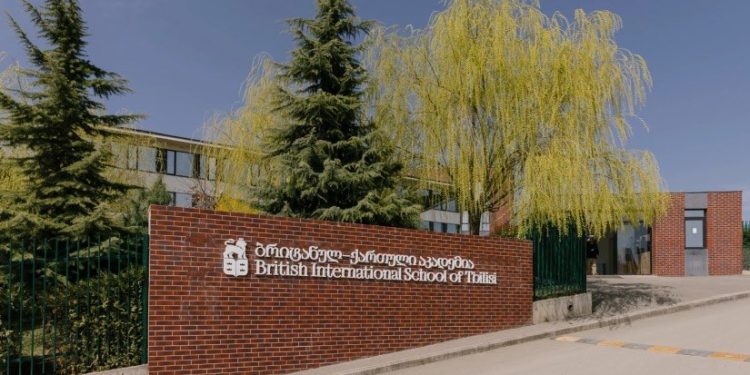The ongoing legal wrangle between the British-Georgian Academy (BGA) and JSC Georgian Capital, which holds a 70% stake in the educational institution, is escalating. As a result, both the BGA’s reputation as one of Georgia’s most prestigious schools and its international accreditation are now at risk. The conflict stems from JSC Georgian Capital’s alleged failure to fulfill the investment obligation that it undertook in exchange for its 70% share, and its attempt to remove the school’s founding partner Natia Janashia from her position as director of BGA LLC.
Indeed, it was on these alleged grounds that Natia Janashia initiated legal proceedings against JSC Georgian Capital. The agreement regarding the latter’s acquisition of a 70% stake in BGA LLC, signed in May 2019, stipulated that the investor (JSC Georgian Capital) would finance rapid development of the school. This was to include the construction of two new campuses, one in Lisi and the other in Okrokana. However, Natia Janashia claims that no such investment has been made within the agreed five-year period.
Meanwhile, JSC Georgian Capital has proposed the dismissal of Natia Janashia, the school founder and owner of the other 30% of BGA LLC shares, from her position as director, and to replace her with its own hand-picked candidate. Subsequently, concerns have been raised about potential risks to students and the overall quality of education at the school. Some fear that the imposition of the new director upon the school, especially considering the indeterminate qualifications of the proposed candidate, may jeopardize the institution’s academic integrity.
In particular, Stephen Priest, the executive leader of the BGA and principal of the British International School of Tbilisi (BIST), expressed serious worry about the possible implications of JSC Georgian Capital’s actions, highlighting that these could endanger the school’s future.
What significance does the accreditation from the Council of British International Schools (COBIS) hold for BIST?
BIST first became a member of the Council of British International Schools (COBIS) in 2015. COBIS is the largest and most important membership organisation for British international schools globally. In 2019, after a visit by COBIS accreditors was awarded the COBIS Patron’s Accreditation. A re-accreditation was successfully achieved in 2023 with BIST given beacon status in the category of leadership as an example of good practice for other schools. COBIS membership represents a mark of global quality assurance, and also offers BIST a valuable network of global support through contacts, consultancies and marketing. Membership also expands opportunities for professional development for staff, including through conferences, webinars, seminars, and sharing good practice and learning. Furthermore, membership enables BIST students to participate in a range of online and face-to-face opportunities. Beyond these direct benefits, COBIS accreditation demonstrates to potential parents and also potential teachers that the school is the centre of educational excellence.
How realistic is the loss of COBIS accreditation for the school if the current school director is replaced?
To remain a member of COBIS, schools must maintain standards that are set by COBIS. These standards cover a range of leadership, management and educational areas. Most importantly, schools must be able to prove that their leadership and employment practices are transparent and that leaders, including the director, are suitably qualified in education, safer recruitment practices and child safeguarding and protection. The removal of a director and the imposition of a new one who has not gone through the appropriate recruitment and vetting and is suitably qualified and experienced does not meet COBIS standards in terms of transparency or recruitment.
What kind of damage will the school suffer if it loses COBIS accreditation in the event of a director change?
The loss of a director who has years of experience in British international schools and also in the Georgian education sector is in itself a significant blow to the organisation – in effect it would wipe out one whole layer of the leadership that the school has been praised for. Losing COBIS membership would mean that the school no longer had access to all the support services and consultancy that membership offers. We would also have no organisation to advocate for us on the global stage. In addition, the school would not be able to use its COBIS membership to attract as many suitably qualified and experienced teachers; nor would it be able to demonstrate to parents, current and potential, that the school meets and adheres to COBIS standards in academics and care for their children.
Which COBIS standards would be violated by appointing the candidate you mentioned to the director position?
There are a wide range of standards that schools must meet to become COBIS members. With this particular issue, there are two standards and within them five sub-standards that could be violated. The two standards relate to safer recruitment and safeguarding (standard 1) and governance (standard 4). Governance is the British term for how schools are led above the level of academic leadership. COBIS Standard 1A states that “The school recruitment process is fair and transparent and ensures that appropriate staff and volunteers are appointed. This applies to all staff, teaching and non-teaching.” Therefore the imposition of a new director who has not gone through an appropriate recruitment and vetting process violates this standard. Recruitment of new staff, whether a teacher or a director, or in fact any employee of the school, must go through a transparent process of being advertised, professional references contacted, qualification checked, etc to remain compliant with COBIS standards. Standard 1B states that “All staff within the school, including volunteers, and supply staff, meet high standards of child protection and the safeguarding of students”. Specific COBIS and/or Safeguarding Alliance training courses must be followed and certificated for a person to become a director of a school. COBIS Standard 4A similarly makes it very clear that directorate level personnel should also be appropriately trained and recruited transparently through stating that “All governors or proprietor(s) meet all the requirements for staff with access to young people, reinforcing the importance of safeguarding within the school”. Also at risk of violation would be Standard 4D that states “There is appropriate induction for new governors”. This is a process where any new governor, voluntary or paid, should undergo an appropriate induction period to ensure that they are fully aware of such issues as safeguarding and safer recruitment as well as the general operations of the school. Lastly, Standard 4F would be violated as it states that “The governors or proprietor(s) provide records of meetings and decisions as appropriate.” If a new director was to be imposed upon the school, a written and fully transparent set of minutes of meetings and decisions should be available.
As far as we know, COBIS has provided the school with the official position regarding this issue. What steps are expected from the Council of British International Schools in the event of an undesirable development?
was important to ascertain from COBIS what would happen if COBIS standards were violated and membership lost. Schools who lose their membership through standards violations would need to prove that such violations have been addressed so that a school is compliant. If a new director is imposed on the school in a process lacking transparency, then effectively the school would have to go through the recruitment process for a new director from the advertisement, interview, vetting, etc process onwards from the beginning, i.e. the newly imposed director would have to be removed from the role and the recruitment process started again.














